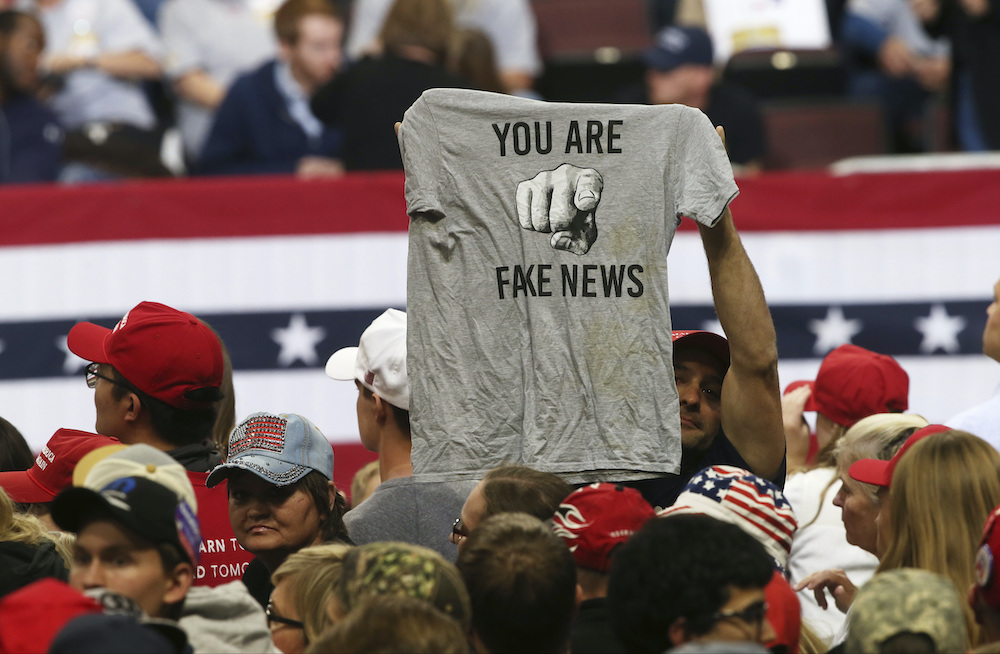
A Trump supporter holds up a T-shirt blasting "fake news" so media could see before a rally address by President Donald Trump in October 2018, in Rochester, Minnesota
There is a significant percentage of Americans who will always distrust us no matter how well our pieces are written, how compelling our broadcasts, how high the stack of documents buttressing the claims in our reports. Even if we found a way to be perfect — and we haven’t been perfect, not even close — that wouldn’t change.
Acknowledging that truth isn’t a call to mock or ignore or dehumanize those in this camp, but a reminder that journalists should focus on improving the quality of our work rather than being distracted by things over which we have little control.
While we shouldn’t dismiss surveys showing the public’s distrust in media increasing, we should give them as much credence as we do surveys asking the public about their confidence in the economy. Less than half of the public has had at least a “fair amount” of trust in the media for the past decade and a half, according to Gallup, down from the more than two-thirds who had that level of trust in the 1970s. Democrats trust the media more than Republicans.
Surveys about public sentiment about the economy are often more affected by who won the latest election than actual economic conditions, nationwide or personally. Media distrust surveys are similarly inexact because there is a significant number of Americans who simply want to believe only what they want to believe and nothing else. There’s no real way of knowing how large this group is. Five percent of the public? Fifty percent? There’s nothing we can do about that. Nothing. The sooner we come to grips with that truth, the sooner we’ll be able to regain our bearings during this surreal period of American history.
What’s happening to the Fox News Channel is instructive, as evidenced in this exchange in which an angry Trump supporter yells at a Fox reporter that “We trusted you.” Why? Because the network dared tell them the truth — that Joe Biden had won Arizona and the presidency. That supporter, like many others, only trusted Fox as long as Fox told them what they wanted to hear and only what they wanted to hear.
Something similar happened to Fox media analyst Howard Kurtz on Twitter when another viewer accused the network of “turning left.” Tucker Carlson, the network’s top-rated prime-time host, was criticized by a few high-profile Fox fans for daring to state the obvious — that Sidney Powell, who has been part of Donald Trump’s legal team to try and overturn Biden’s victory, had not provided any evidence for her many unhinged claims.
A significant number of disgruntled Fox fans — who lapped up Fox falsehoods and its kid glove treatment of Trump’s thousands of falsehoods over the past four years — have been turning to places such as Newsmax and One America News Network and online outlets such as Parler to remain in their information bubbles.
Conservatives aren’t the only ones susceptible to this. Think of liberals who believed the 9/11 attacks were an inside job, votes were stolen in Ohio from John Kerry in 2004, and threaten to end their subscriptions to The New York Times every time reporter Maggie Haberman says something insufficiently critical of Trump. It’s just that we’ve had a conspiracy theorist in the White House the past four years, which inflamed conservative fringe thinking and brought it into the mainstream in a more pronounced way than liberal fringe thinking has been.
It’s difficult to determine if that imbalance is a result of different ways of thinking or simply a result of circumstance and opportunity. Either way, acknowledging the limits of journalists’ ability to affect media trust levels can head off a potential repeat post-Trump.
CNN’s Jake Tapper empathized with misled Americans during an interview with Vanity Fair. Trump’s supporters, in Tapper’s telling, are “outraged because they’re being told things that aren’t true. And that’s a disgrace for the people who are telling the lies, not the people who are hearing them and getting outraged.”
I get Tapper’s point. It’s true, though incomplete. They are outraged because they’re being told things that aren’t true, but they will never be satisfied with truth.
In my earliest years as a full-time columnist, my editors tried to protect me. They didn’t want me to be seen as the “Black” columnist by our mostly white and conservative readership. They essentially put a pitch count on the times I could write about race — in South Carolina, where the Civil War began and the Confederate flag still flew.
I repeatedly told them there was nothing I could do to reach any reader who decided to see me through that lens. Nothing. They ignored my pleas. My work suffered because we had stopped making decisions about what I should be reporting or writing based on our best news judgment and instead on how unreachable readers would respond.
That’s one of the advantages of being a minority in the newsroom. You notice things your white counterparts often can’t, not because you are wiser, but because you are forced to deal with those things first. That experience teaches you that the best recourse is to just do your job well and let the chips fall, that doing anything else would hurt the quality of your work and negatively affect your mental health.
Journalists gain nothing by ignoring the truth that, though we must ensure our work is fair and accurate and excellent, it’s not within our power to shed the “liberal bias” or any other label under which some in our audience claim we operate. Our readers bring biases with them to our words and broadcasts. What we do is an interaction, and we only have control over one half of that interaction.
It’s something we better come to grips with, or we’ll convince ourselves the best way to do our jobs is to drive the back roads to rural diners — or maybe Starbucks or hipster restaurants in 2021 — and become parodies of ourselves once again by writing the same darn cliched story a thousand times over.
Expending energy trying to reach the unreachable can corrupt our work in ways subtle and not.
Issac Bailey, a 2014 Nieman Fellow, is a journalist, race relations seminar creator and facilitator, and the author of “Why Didn’t We Riot? A Black Man in Trumpland.”


